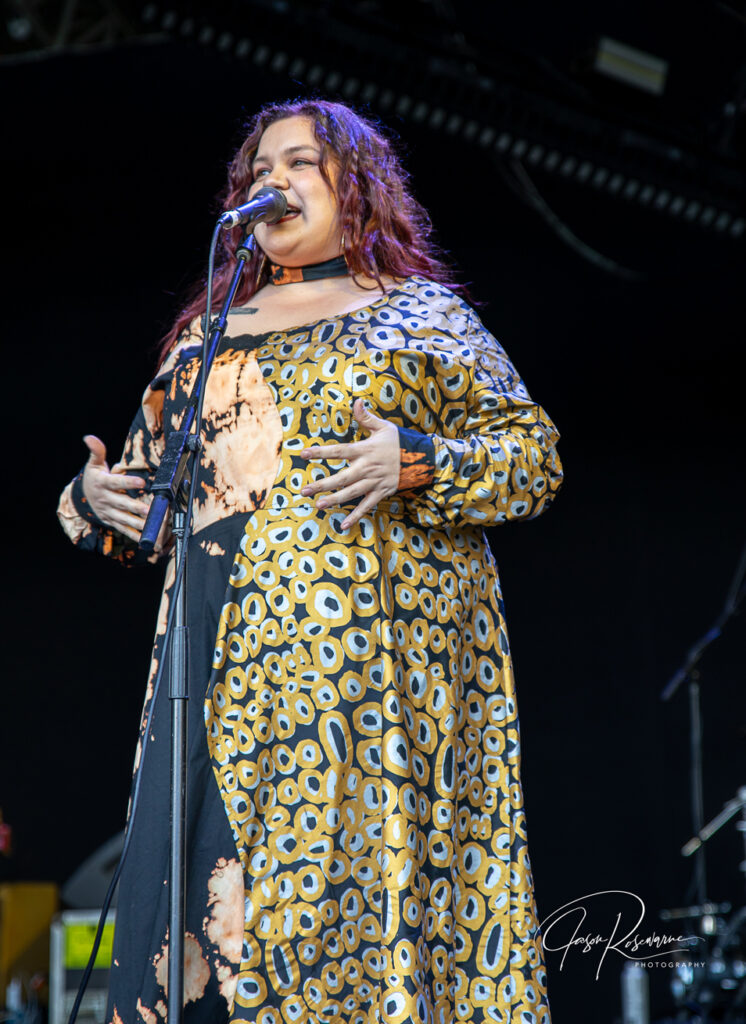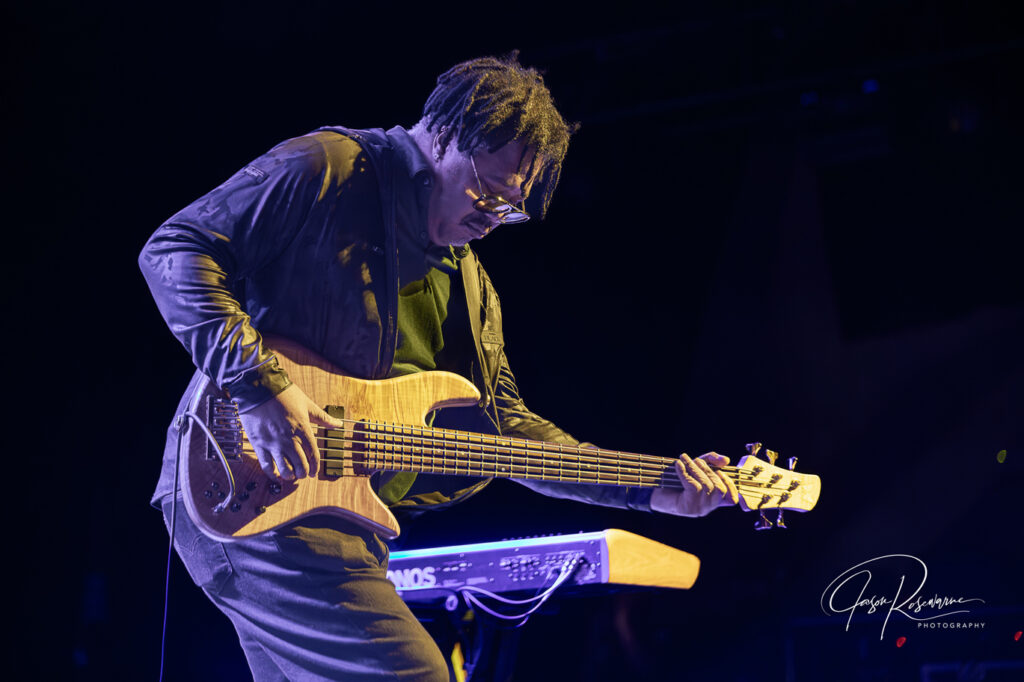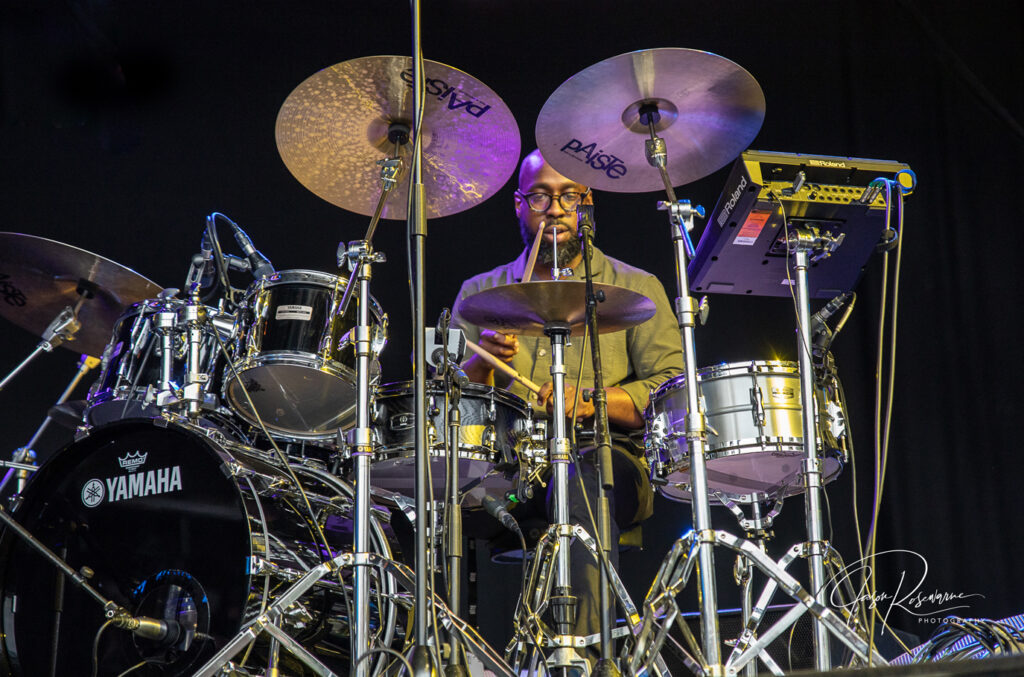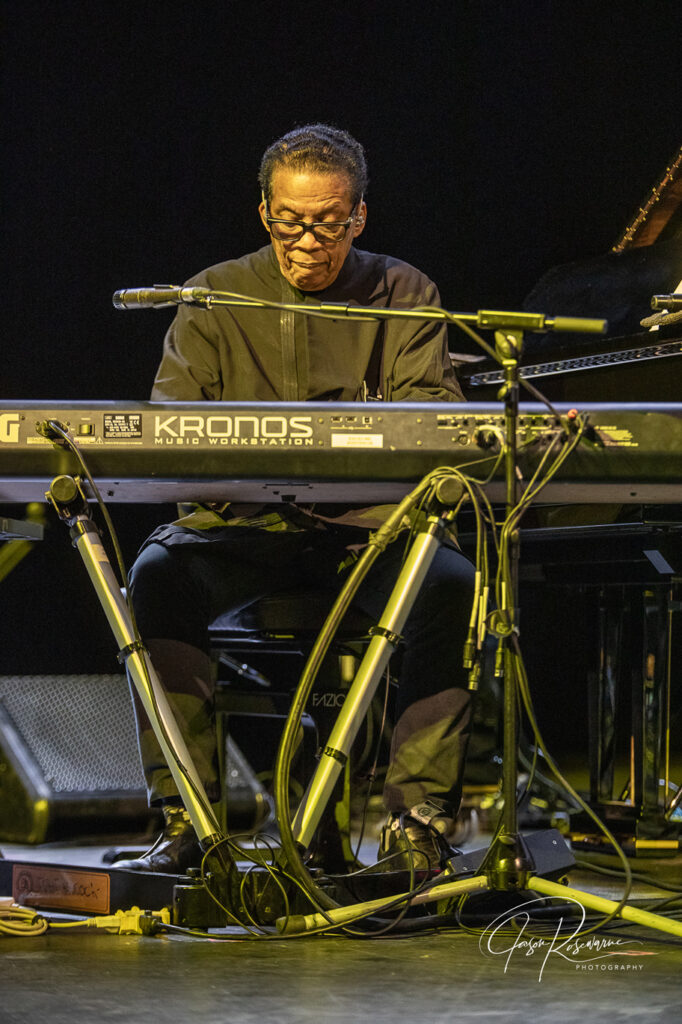
Review: Greg Phillips Photos: Jason Rosewarne.
It was heartening to witness a packed house at the Sidney Myer Music Bowl last night for many reasons. Firstly, after such a promising, sunny spring day, the evening chill could have easily deterred attendees, yet the crowd still came out in force to celebrate the marquee event of the Melbourne International Jazz Festival. Secondly, it was wonderful to see so many discerning music fans wanting to experience and pay homage to two genuine jazz music legends, Marcus Miller and of course Herbie Hancock.
Opening proceedings was local singer Bumpy. Billed as one of the country’s most vibrant and captivating soul singers, award-winning composer, vocalist and Noongar woman Bumpy performed with a large band performing her fresh, slick brand of soul, much to the appreciation of the jazz fest audience.

Marcus Miller’s résumé as an A-list player brims with over 500 recording credits as a sideman on albums across the spectrum of musical styles: rock (Donald Fagen and Eric Clapton), Jazz (George Benson, Dizzy Gillespie, Joe Sample, Wayne Shorter and Grover Washington, Jr.), pop (Roberta Flack, Paul Simon and Mariah Carey), R&B (Aretha Franklin and Chaka Khan), hip hop (Jay-Z and Snoop Dogg), blues (Z.Z. Hill), new wave (Billy Idol), smooth jazz (Al Jarreau and Dave Koz) and opera (collaborations with tenor Kenn Hicks and soprano Kathleen Battle). Additionally, he’s as proficient on keyboards and clarinet/bass clarinet as he is as a legendary bass player.
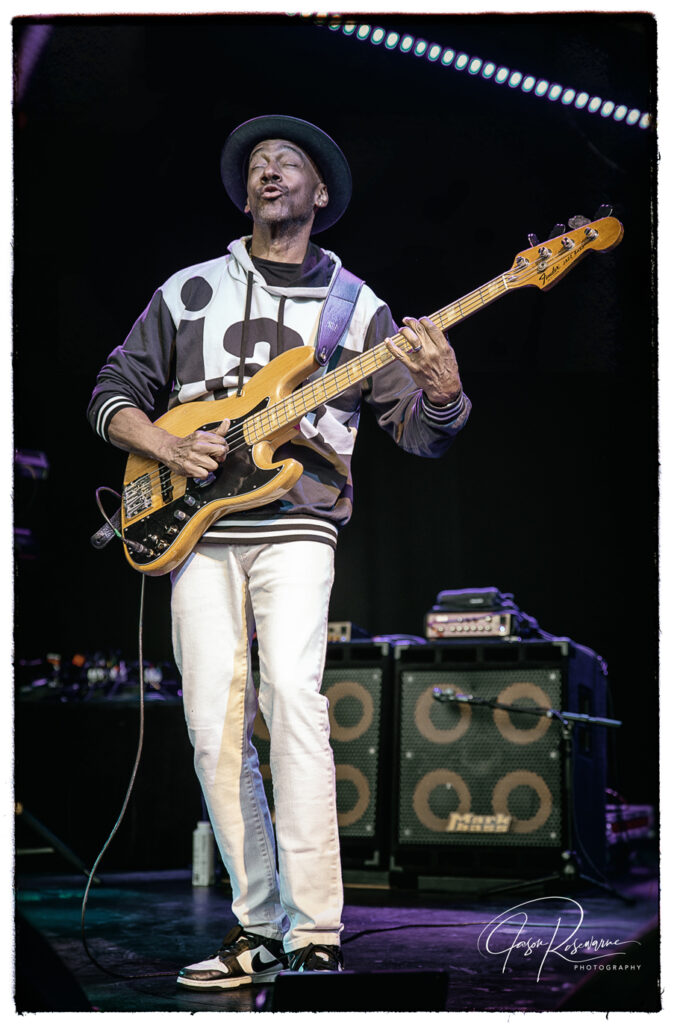
Marcus Miller and band took to the expansive Music Bowl stage and eased into Panther, a tune which originally appeared on his 1997 recording Live & More. The track gave the whole band the chance to loosen the limbs for a few minutes before that distinctive slapping bass grabbed back the attention. It was already apparent that these guys have incredible spatial awareness, knowing when to colour a moment and when to hold back. Drummer Anwar Marshall, in particular was all over this one, showering the sound with his intricate stick work.
Marcus then introduced Red Baron, a Billy Cobham cover, highlighting Donald Hayes searing sax lines and some tasteful Rhodes keyboard sounds from Xavier Gordon.
Armed with his signature Fender Jazz bass, Miller’s sound was pumped through two Marcus Miller Markbass heads and two 4×10 Markbass cabs. The bass notes coming off stage were deep and bold, featuring a rich clarity that only a master musician could achieve.

In 1989 Marcus collaborated with jazz great Miles Davis on an album called Amandla. As Marcus told the Music Bowl audience, he wrote a song titled Mr Pastorius, a tribute to Jaco and hoped that Miles would record it in his ‘old style’ of playing. Miles had always told him that playing in his old style was like wearing old clothes. Marcus suggested to Miles that “yeah but you got some nice old clothes!” The band’s performance of the tune last night was sublime, with trumpet player Russell Gunn Jr faithfully conjured the spirit of Miles. Meanwhile, Miller in the background provided a smokin’ understated bass groove.
Run For Cover, a David Sanburn cover gave the audience the opportunity to encounter the full gamut of Miller’s playing styles, from slap to picking, soloing and everything in between. During the tune, a second keyboardist swapped places with Xavier Gordon to jam out with the band. Marcus explained that it was his former keyboardist Brett Williams, who had “made the mistake of visiting Australia and never came back!”
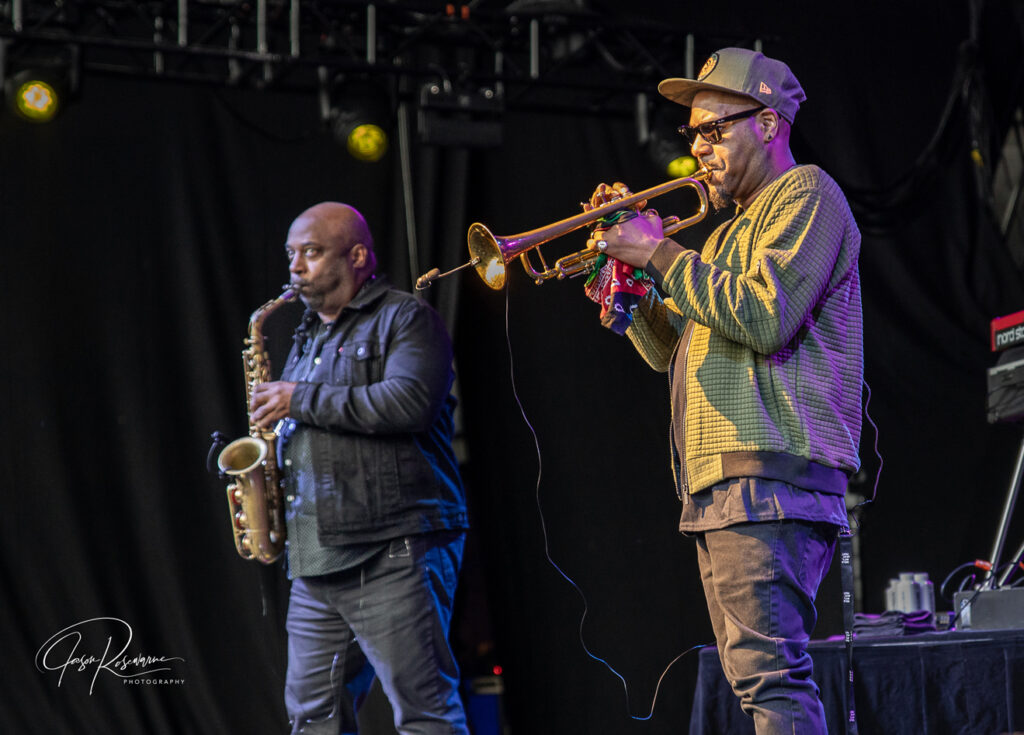
Marcus then told us that after a significant trip to a Senegal museum to slavery, he was moved to write the tune Gorée. It had become a signature tune for the band but for whatever reason, was shelved for some time. He suggested that with so much negativity around the world at the moment, it was time to bring it back. It began with a beautiful piano prelude provided by Xavier Gordon. Marcus donned his bass clarinet and was joined by his brass players Russell Gunn Jr and Donald Hayes in creating a powerfully dramatic show highlight.
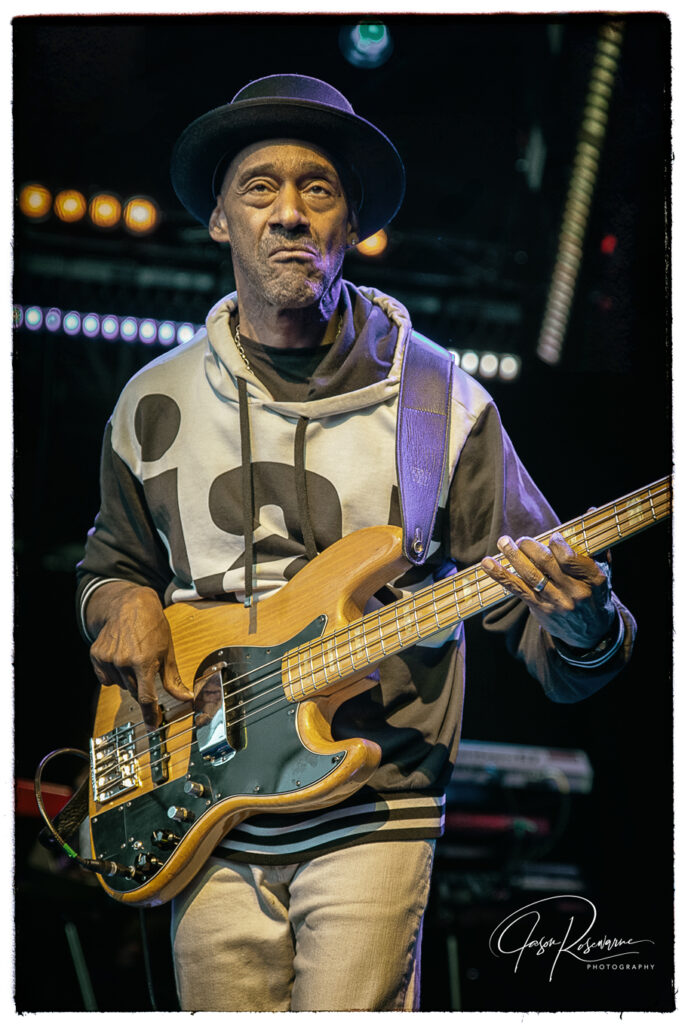
With another nod to Miles, the band then finished up with Tutu, the title track from Miles Davis’ 1986 album and tribute to to Archbishop Desmond Tutu. It allowed yet another spot for Miller to display his remarkable finger dexterity, both on the strings and the fretboard. As the band worked their way to a jubilant crescendo, the audience rose to their feet in appreciation of a truly magical performance.
With an amazing career spanning five decades and 14 Grammy® Awards, there are few artists in the music industry who have had more influence on acoustic and electronic jazz and R&B than Herbie Hancock. As the immortal Miles Davis said in his autobiography, “Herbie was the step after Bud Powell and Thelonious Monk, and I haven’t heard anybody yet who has come after him.”

The great Herbie Hancock and band walked onto stage without fanfare as the crowd erupted into applause. He then sat down for a chat, explaining that he’d been making music for decades and to encapsulate his extensive career, he’d begin with a selection of pieces he calls Overture, utilising the effect patch ‘Prehistoric Predator’ on his Korg Kronos keyboard. The piece showcased the dynamic range of acclaimed trumpet player Terence Blanchard, who has written more than 80 film and television scores, as well as two operas. It also revealed young drummer Jaylen Petinaud’s wonderful combination of power and complexity in his percussion style. All the while Hancock’s own elegant piano playing and intriguing note choices were on full display. Guitarist Lionel Loueke’s first appearance in the spotlight presented a truly unique playing style, enhanced by an extraordinary vocal effect.
While Marcus Miller and band provided a perfect example of groove and feel-style jazz, Hancock offered a more esoteric, experimental approach, not that there weren’t plenty of elements of groove in the mix too. Herbie Hancock is forever the innovator, breaking down boundaries and reaching out for sonic ideas that mere mortals wouldn’t contemplate. It’s no surprise that some have dubbed the man The Chameleon.
Footprints followed, a cover of a tune written by Herbie’s late friend and collaborator Wayne Shorter and arranged by trumpet player Terence Blanchard.

Actual Proof, a tune from his 1974 album Thrust showed why Hancock is held in such high regard in the development of fusion and bringing electric piano and synths sounds into jazz, particularly with his project The Headhunters. Equally up to the task was guitarist Lionel Loueke, who provided alien-like sounds emanating from the effects connected to his his gorgeous German-made semi-hollow body Schottmueller guitar. In contrast to Marcus Miller’s full-flavoured and crystal clear bass sounds, the tone of Hancock’s bass player James Genus, was more tubular and muted, his playing style more noodly. The overall effect was still exquisite and complimentary to Herbie’s music, just different to Miller.
We Are All One Family was another case of Herbie pushing boundaries as he spoke and sung his way through some kind of vocoder. While the piece certainly had moments of great beauty, it’s duration may have tested newcomers to the man’s more avant-garde repertoire.

A medley of Hang Up Your Hang Ups / Rockit / Spider enabled Hancock to unveil his Keytar and perform a range of more accessible, upbeat tunes, ending the evening with a funky version of Chameleon. The tune saw Herbie trading Keytar licks with Loueke’s guitar and uncovered an agility that defied his 84 years of age.
A Herbie Hancock performance demands attention and while occasional moments may be more intense and heavy going than others, the rewards of experiencing such innovation and genius are well worth your patience. Music icons are legends for a reason, a fact not lost on this crowd who gave Hancock a resounding standing ovation on a jubilant opening weekend of the Melbourne International Jazz Festival.
https://www.melbournejazz.com/program/
